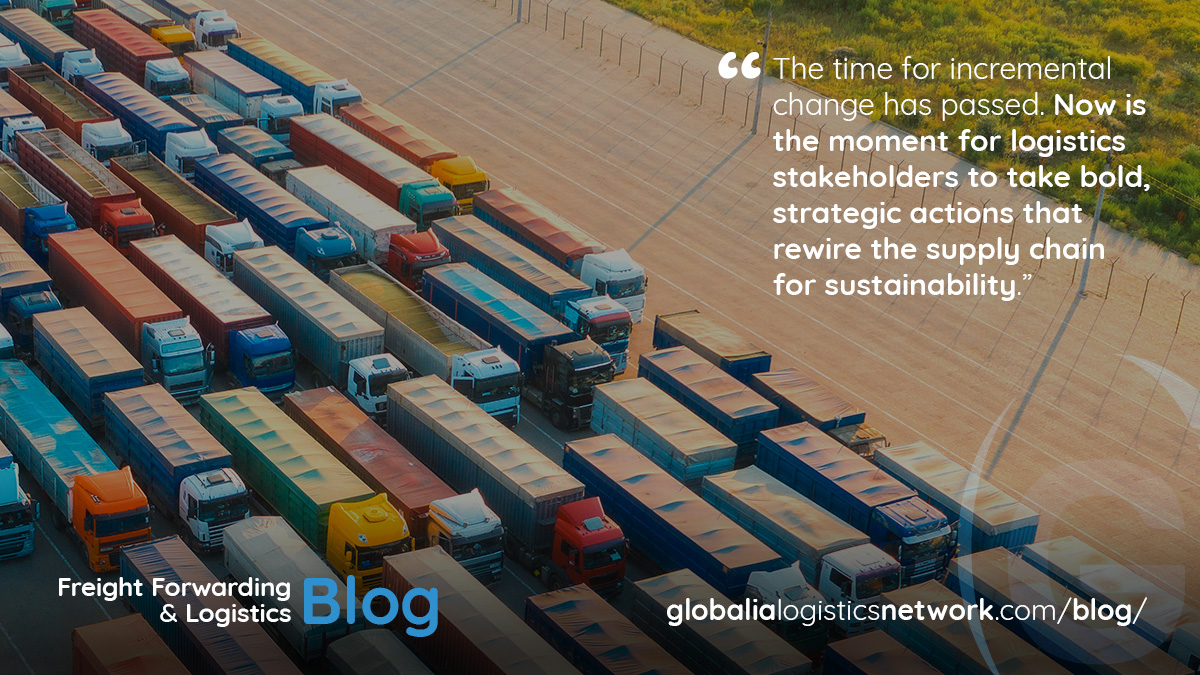As the world gears up to commemorate World Environment Day on 5th June, the spotlight is once again on industries that hold the power to influence global sustainability. One such sector is logistics—an essential engine of the global economy, but also a significant contributor to greenhouse gas emissions. In particular, freight forwarders, who serve as key intermediaries in cargo movement, are uniquely positioned to drive change and promote eco-conscious practices across the entire supply chain.
With increased public awareness about environmental degradation, customers, regulators, and partners are demanding greater accountability from logistics service providers. The need to green the supply chain is no longer a lofty goal—it’s a strategic imperative. As we stand on the threshold of a sustainable transformation, freight forwarders have a chance to reimagine how goods are moved, stored, and delivered while reducing their carbon footprint.

Driving Green Innovation in Global Freight Logistics
The transformation toward sustainability in global freight logistics begins with innovation at the operational level. Freight forwarders, through their day-to-day handling of multimodal cargo, can reduce emissions by optimizing route planning and consolidating shipments more effectively. Leveraging digital platforms and AI-powered tools allows logistics professionals to identify the most efficient transport routes, thereby minimizing fuel usage and idle time.
Transportation accounts for the majority of emissions in logistics operations. By collaborating with carriers who offer low-emission vehicles—such as electric trucks or ships using alternative fuels—freight forwarders can influence the decarbonization of the entire transport chain. In addition, digital freight matching and intelligent scheduling systems can reduce the number of empty or half-loaded vehicles on the road, enhancing efficiency and reducing waste.
Sustainability can also be embedded in inventory planning and warehouse management. Modern supply chains increasingly rely on real-time data to anticipate demand and avoid unnecessary stock movements. This helps prevent the environmental impact of rushed or repeated deliveries while improving customer satisfaction.
Sustainable Packaging and Warehousing in Global Freight Logistics
An often-overlooked area where freight forwarders can make a big difference is packaging. Excessive or non-recyclable materials used during transportation contribute significantly to global waste and emissions. Freight forwarders can work closely with shippers to choose eco-friendly alternatives such as biodegradable packing materials, reusable crates, and optimized packaging designs that reduce volume and weight.
In the warehousing segment, green practices are gaining momentum across the global freight logistics sector. From installing solar panels on facility rooftops to implementing smart lighting systems that conserve electricity, there are numerous ways to reduce environmental impact. Temperature-controlled warehouses—essential for pharmaceuticals, food, and perishables—can adopt energy-efficient insulation and refrigeration systems powered by renewable energy sources.
Beyond infrastructure, staff training on sustainable warehouse procedures is equally vital. Encouraging employees to follow best practices, like minimizing energy use or recycling materials, contributes to a broader culture of environmental responsibility within logistics operations.
Collaboration and Carbon Offsetting: Building a Greener Freight Ecosystem
Freight forwarders are not isolated operators—they are the connectors in a complex web of manufacturers, shippers, carriers, and customers. This interconnectedness presents a tremendous opportunity to influence greener supply chain decisions. By partnering with environmentally responsible service providers and encouraging clients to choose low-emission transport options, forwarders can amplify their impact.
One practical way to mitigate emissions in unavoidable transport activities is through carbon offsetting. Many freight forwarders now offer carbon-neutral shipping options, where emissions are calculated and offset through investments in certified climate projects such as reforestation or renewable energy development. While not a substitute for emission reduction, offsetting is a meaningful step in reducing the environmental cost of logistics operations.
Freight forwarders can also join industry alliances or logistics networks that prioritize sustainability, thereby gaining access to shared resources, training, and tools that support green transformation. Certifications such as ISO 14001 (Environmental Management) or membership in sustainable logistics coalitions further demonstrate a forwarder’s commitment to responsible practices.
Digitalization and Transparency for a Sustainable Supply Chain
The path to greener freight isn’t just about hardware like EVs or packaging—it’s also about information. Digitalization plays a critical role in improving transparency, traceability, and decision-making in supply chains. Through real-time tracking systems and centralized data platforms, freight forwarders can monitor carbon emissions, delivery times, and transport efficiency with remarkable accuracy.
By generating carbon reports for each shipment, logistics providers can help their clients better understand the environmental impact of their supply chain choices. This data empowers shippers to set their own sustainability goals and work collaboratively with freight partners to achieve them.
Blockchain and Internet of Things (IoT) technologies are also becoming part of the green logistics toolkit. These tools ensure supply chain accountability and improve visibility across transport modes, enabling a smarter allocation of resources and reducing redundancy.
Empowering Freight Forwarders as Green Leaders
Freight forwarders often serve as advisors to their clients on everything from customs compliance to route optimization. This advisory role gives them a voice of influence when it comes to sustainability. By promoting green logistics solutions and educating customers on eco-friendly practices, freight forwarders can actively shape a more responsible supply chain culture.
For example, offering green shipping as a standard option rather than a premium add-on can normalize sustainability in logistics contracts. Highlighting the long-term cost savings of fuel-efficient transport or reduced packaging waste helps clients see sustainability not just as an ethical choice but a business-savvy one.
Furthermore, internal sustainability initiatives—such as office recycling programs, digital documentation to reduce paper usage, or remote work policies that cut commuting emissions—reflect positively on the freight forwarding brand and attract environmentally-conscious clients.
Looking Ahead: The Future of Green Supply Chains
As we observe World Environment Day on 5th June, the message is clear: the time for incremental change has passed. Now is the moment for logistics stakeholders to take bold, strategic actions that rewire the supply chain for sustainability. Freight forwarders, with their extensive influence and central role in transport management, are ideally placed to lead this transformation.
From adopting low-emission transport modes and sustainable packaging to embracing digital tools and carbon offsetting strategies, there are countless ways to make an impact. These practices not only protect the planet but also deliver measurable value—reduced fuel costs, better customer loyalty, and resilience in an evolving regulatory landscape.
As the green revolution takes root across the global freight logistics sector, it’s the proactive, environmentally-minded freight forwarders who will lead the charge. Their leadership today can shape a cleaner, more efficient, and more responsible logistics industry for tomorrow.


